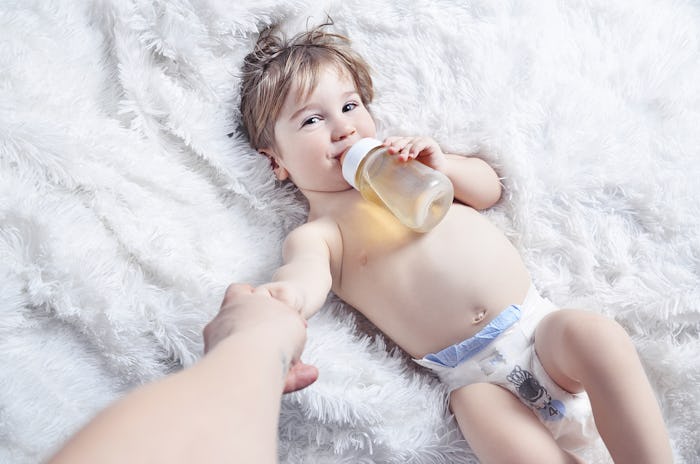Life

Here's How Using A Bottle After 1 Actually Affects Your Kid Later In Life
When it comes to babies, we know that every child is different. No one method works for all kids, parents, or families, so it's hard for us to decide what to do. If your little one is nearing her first birthday, you might be considering weaning options from breast milk/formula and from bottles. There are sure to be plenty of opinions on those subjects from your circle or friends and family, but does it really matter when you stop the bottle? Here's how using a bottle after one affects your kid later in life, so you can make a prepared decision.
"The motion of the mouth and muscles while sucking on a bottle (or even a pacifier) can cause incoming and existing baby teeth to become mis-aligned," notes Dr. Larry Williams, DDS. This mis-alignment can actually remain even after baby teeth are replaced by permanent teeth, Williams tells Romper. When a child continues to use a bottle or pacifier past 12 months of age, they could develop an open bite where their front teeth remain open even when their mouth is closed. In addition, "drinking from a bottle can cause frequent and long-term exposure of the child’s teeth to liquids," Williams continues. This could ultimately cause cavities.
Drinks like milk, juice, and even formula and breast milk (all of which are popular choices for bottles), all contain sugars that lead to tooth decay. If your child continues to drink from a bottle past their first year, the effects of bottle decay could be prolonged, he also notes.
This becomes particularly problematic if your little one is going to bed with a bottle. "Nighttime bottle feeding with drinks like juice or milk increase the risk of cavities because the sugars (natural or added) stick to a baby’s teeth and help create acid that attacks the teeth," notes pediatric dentist Dr. Hyewon Lee, DMD, MPH. If your baby needs a bottle to go to sleep, it's best to fill it with water, she tells Romper.
To add even more stress about cavities, dentist Dr. Katia Friedman tells Romper, "Rampant cavities can be very difficult to treat at such an early age and might require for the child to be put to sleep for dental treatment." Trying to prevent cavities is likely a much easier situation to deal with.
Establishing an oral care routine with your kid is a great thing to begin early. Even before they have teeth, their gums can be wiped down with a soft washcloth. Once those little teeth poke through, brushing twice a day with a soft toothbrush will help to firm up your care routine and stick with it as they get older. Experts encourage holding off the fluoride toothpaste until after your kid's second birthday, and even then, using a very small, pea-sized amount on their brush.
It's worth mentioning that it's possible that continued bottle use also could lead to increased weight or obesity, says Friedman. Once a child starts eating solid food consistently, adding a bottle to that can easily add extra calories to your baby's diet, she notes. Since older babies are more likely to tote bottles around and suck on them aimlessly, most pediatricians recommend keeping drinks (besides water) at the table to prevent overconsumption.
If you're concerned about the effects of bottle use in your older baby, be sure to talk to your pediatrician. They can offer you guided input specific to your family and baby. As with most child-related situations, there's not a one-size-fits-all type solution. Often, going with what you and your healthcare provider think is best for your child and family and drowning out the rest of the noise is the best option.
Check out Romper's new video series, Bearing The Motherload, where disagreeing parents from different sides of an issue sit down with a mediator and talk about how to support (and not judge) each other’s parenting perspectives. New episodes air Mondays on Facebook.